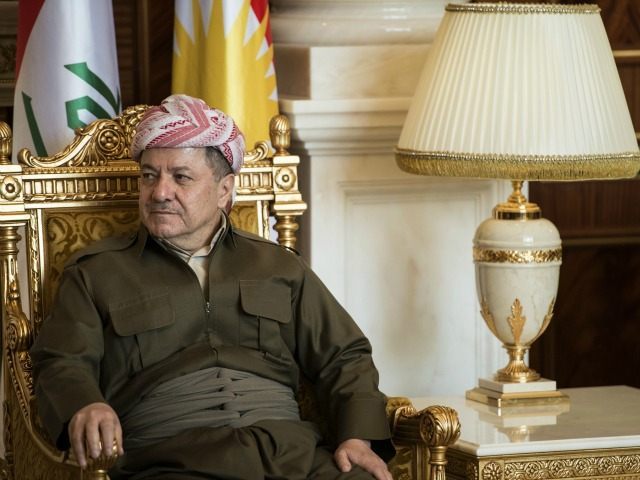The president of Iraqi Kurdistan, Masoud Barzani, declared in an interview with Swiss newspaper Neue Zuricher Zeitung that “Kurdistan is ripe for independence.”
“Inshallah, this year a referendum will be held,” said Barzani, according to the Rudaw news agency’s translation of the interview, using a Muslim phrase that means, “if God wills.”
“No resolution can be imposed and any new resolution now has to be made through referendum,” Barzani added. “Each nation has its own natural borders, and those borders that have been drawn through the use of force should not be maintained anymore.”
This last was a reference to the Sykes-Picot agreement, which drew the borders of the modern Middle East and has just reached its 100th anniversary. Barzani has frequently criticized Sykes-Picot as obsolete and hinted that the 100th anniversary would present an ideal opportunity for big changes.
“I think that within themselves, [world leaders] have come to this conclusion that the era of Sykes-Picot is over,” he told the UK Guardian in January. “Whether they say it or not, accept it or not, the reality on the ground is that. But as you know, diplomats are conservatives and they give their assessment in the late stages of things. And sometimes they can’t even keep up with developments.”
Barzani said independence for Kurdistan was “now closer than at any other time” in that January interview, citing political discord in Iraq, the rise of the Islamic State, and the Syrian civil war as reasons it was time for the Kurds to go their own way. He said that after the fall of Saddam Hussein, his people “went to Baghdad and tried our best through the constitutional process, but the existing culture in Iraq is not one of co-existence, so if we can’t live together we have to live with other alternatives.”
He sounded that theme again during a visit to Washington at the beginning of May. “I cannot say if it will be in the next year, or when, but certainly the independent Kurdistan is coming,” Barzani predicted on that occasion, adding that a referendum would take place when the “security situation is resolved.”
In other words, he said the Kurds would finish the job of defeating ISIS before giving any serious attention to founding their own independent state. He repeated this in his interview with Neue Zuricher Zeitung, stressing that “the fight against ISIS is our priority,” and the Kurds were “ready to take part in the Mosul offensive.”
President Obama and Vice President Joe Biden reportedly stressed to Barzani during his Washington visit that the United States preferred Kurdistan to remain within a federalized Iraqi government, but now Barzani is once again saying that the hour of independence draws nigh.
In his latest comments, Barzani stressed that the world order behind the Sykes-Picot agreement is gone, and Kurdish citizenship within Iraq has not worked out.
“Undoubtedly, we welcome the fact that our 40-50 million nation has to have a state of its own, but we must also consider the fact that we are divided into four parts. And each part has its own situation and each should find a solution with its central governments,” said Barzani.
By this, he seems to be referring to Kurdish populations in different countries and suggesting that independence for Iraqi Kurdistan would not necessary trigger Kurdish communities in other nations to secede and link up with a greater Kurdish super-state. This will be necessary reassurance for nations like Turkey, which are very much concerned with the idea of a unified Kurdish power absorbing Turkish territory and resources.
Rudaw ventures that the timing of a Kurdistan independence referendum might coincide with the U.S. presidential election in November, or possibly even sooner. That’s a very optimistic timetable, if Barzani is serious about delaying the referendum until the ISIS situation is well in hand, which would almost certainly mean the captive Iraqi city of Mosul had been liberated from the Islamic State.

COMMENTS
Please let us know if you're having issues with commenting.